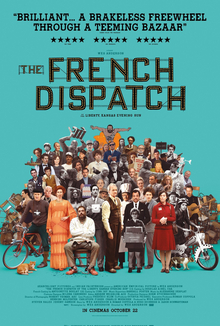I’m not really an enthusiastic fan of the films of Wes Anderson even if I tend to enjoy them and this newest one makes for a pretty good illustration of why. It’s almost pure style with no real underlying theme except for a love of its setting. There’s no character development and it actively tries to avoid emotional engagement. Anderson himself calls it a love letter to journalists, well, maybe a very specific kind of foreign correspondent from a bygone era. But it feels to me like more of a tribute to France, at or at least a kind of idealized France of the 1960s according to the American imagination. It’s supremely gorgeous and fun but ultimately feels hollow and unsatisfying.
This is an anthology of three main stories together with some shorts introducing the setting and providing a frame. Arthur Howitzer Jr., son of an American newspaper publisher, establishes The French Dispatch,a literary supplement, in the town of Ennui-sur-Blasé in the post World War 2 period. The three stories depict the work of his journalists. The first one is about an artist Moses Rosenthaler serving a long sentence in prison for multiple murders who paints a nude abstract portrait of a guard Simone. An art dealer also in the prison notices the portrait and decides to promote his work. The next story is about a student protest in the town that extends for months and grows in intensity. The reporter Lucinda Krementz, an older single woman, becomes romantically involved with the student protest leader Zeffirelli. The last story is about writer Roebuck Wright who is invited to eat with the Commissaire of the police to partake in a form of haute cuisine developed by the police. During the dinner, the Commissaire’s son is kidnapped by criminals and the police mount an operation to rescue him.
All three stories are fanciful flights of pure imagination and even the premise of a newspaper outpost staffed entirely by Americans in some minor French town seems far-fetched to me. My favorite is the last of the three due to the over-the-top idea of a specialized form of cuisine developed by the police and it later turns into an action-packed adventure. They do switch to an animated sequence for the action scene though probably because it would cost too much to film in real life. The story about the student protests feels pointless to me and I suspect that Anderson simply wanted to make his own interpretation of the 1969 protests. Even more than the crazy ideas and colorful characters, this is mainly a showcase for meticulously soigné visual compositions: the picturesque French town, the inside of a prison, the many rooms that make up a police station and so on. Each and every shot is striking and gorgeous. As I’ve said before, Anderson’s work are really meant to be cartoons for adults and it’s ever more obvious here. Pretty much all of the dialogue is forgettable to me and I think isn’t meant to be taken seriously at all. They’re all just jokes and references delivered in the usual Wes Anderson deadpan style. This style makes whatever is going on, no matter how violent or tragic or ludicrous, feel emotionally distant from the audience, something that we experience only at a safe remove.
A more serious criticism is that some of the stories mean to be mean-spirited. Julien Cadazio the art dealer doesn’t really understand what Rosenthaler has painted but works hard to promote him anyway and successfully creates a new art sensation. The French students begin their protest over equal access for boys and girls to the girls’ dormitory. It snowballs to huge proportions but then peters out when it is revealed that the leader of the girl side of the protests is in love with Zeffirelli. The portrayal of haute cuisine in the last story isn’t too bad but we’re also meant to gently laugh at how the French, both the police and the criminals, take the time to have a proper sit-down dinner even in the middle of a crisis. Then there’s this whole caricatural portrayal of France with names like Le Sans Blague café and even the town name of Ennui-sur-Blasé. There’s a gem of truth in these portrayals, which is what makes the film effective, but it’s also misleading and seems to be mocking its subjects. It just seems so unkindly and ungracious to me.
I’m always amazed how Anderson gets all these Hollywood stars fighting to get small roles in his films and this is of course gorgeous and fun to watch. However I’d rank this fairly low among the director’s body of work. It’s all flash and style but ultimately doesn’t really have anything to say at all, except that France was a pretty cool place to be in the 1960s.
